人教版八年级下册Unit 9 Have you ever been to a museum?知识点复习课件(共56页PPT)
文档属性
| 名称 | 人教版八年级下册Unit 9 Have you ever been to a museum?知识点复习课件(共56页PPT) | 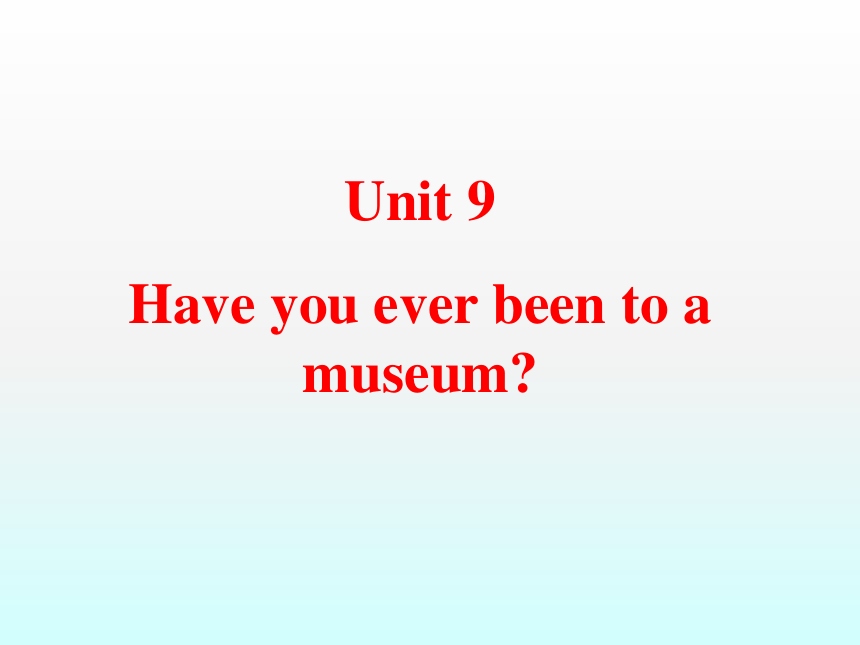 | |
| 格式 | zip | ||
| 文件大小 | 3.4MB | ||
| 资源类型 | 教案 | ||
| 版本资源 | 人教新目标(Go for it)版 | ||
| 科目 | 英语 | ||
| 更新时间 | 2020-03-08 19:36:34 | ||
图片预览

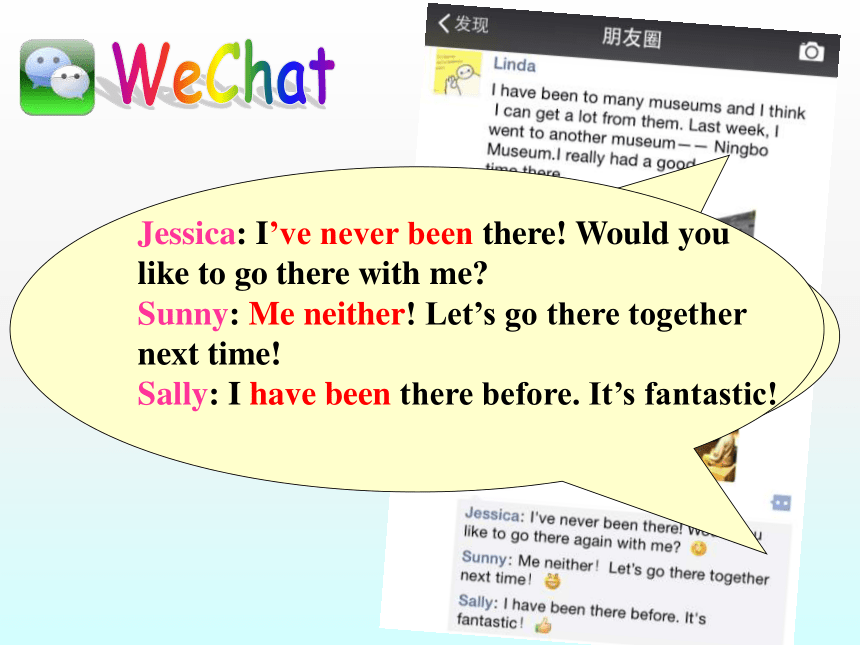
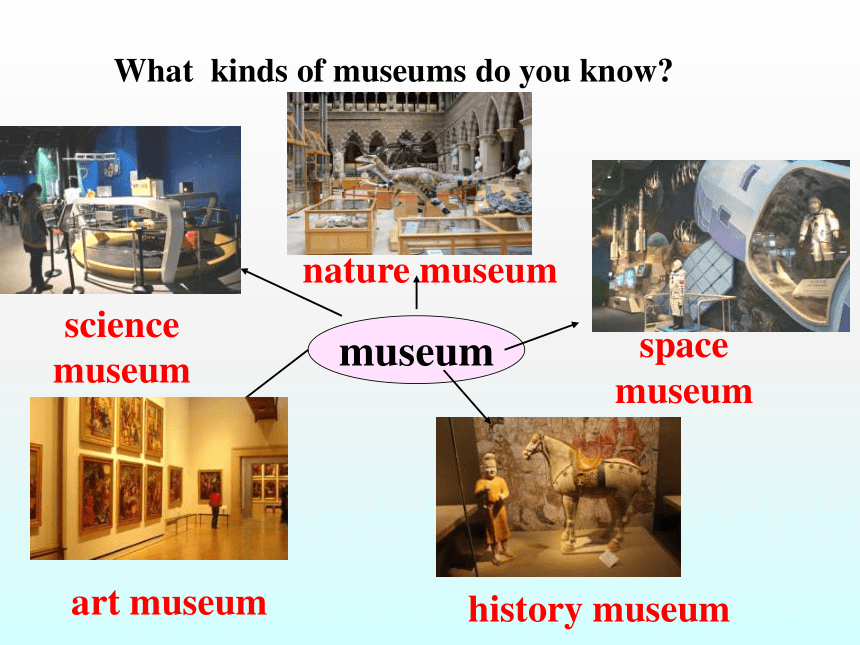
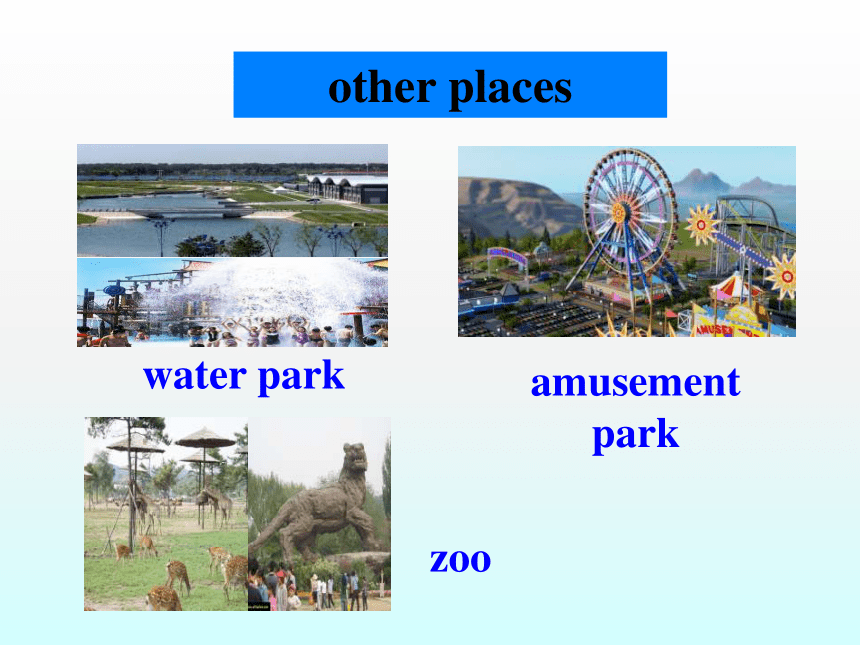
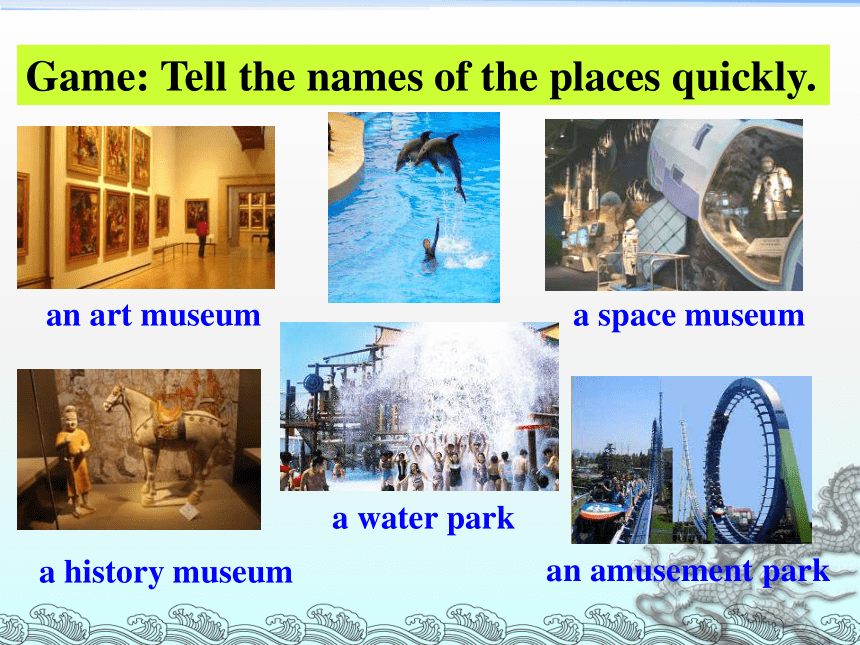
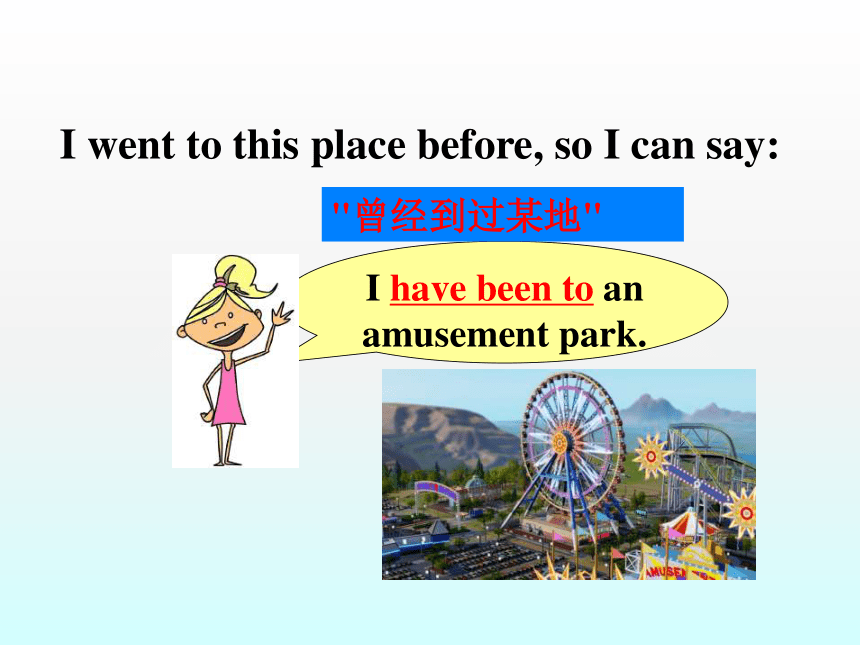
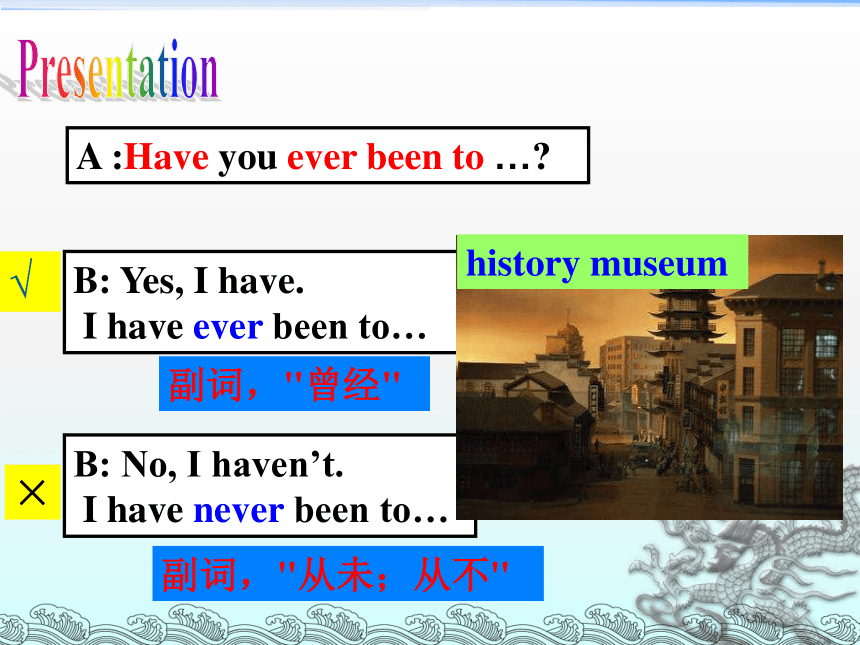
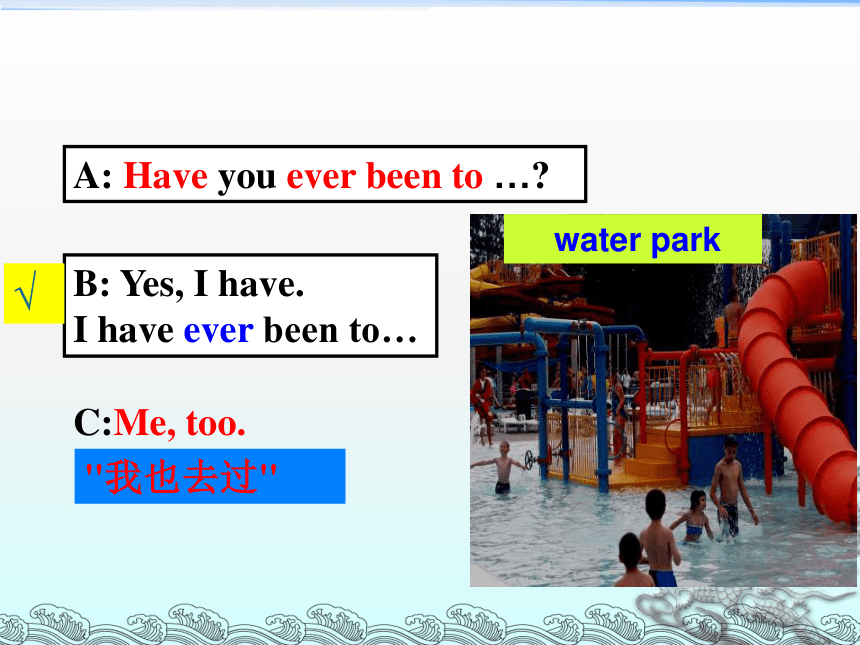
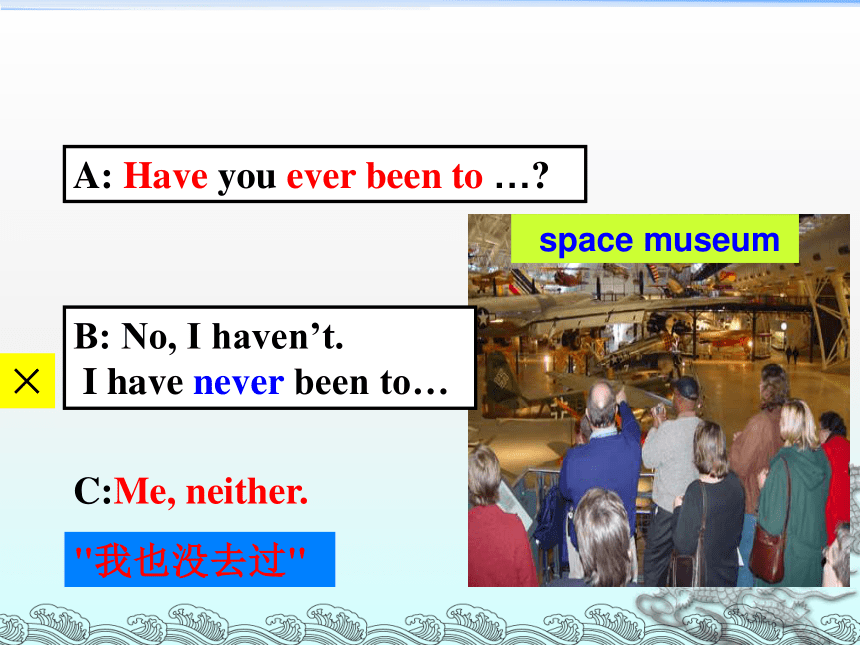
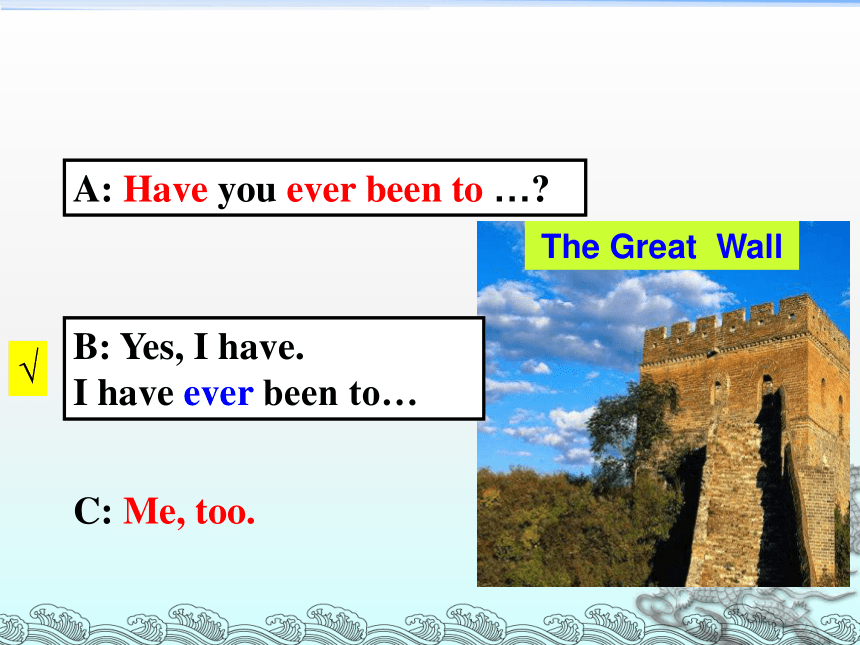
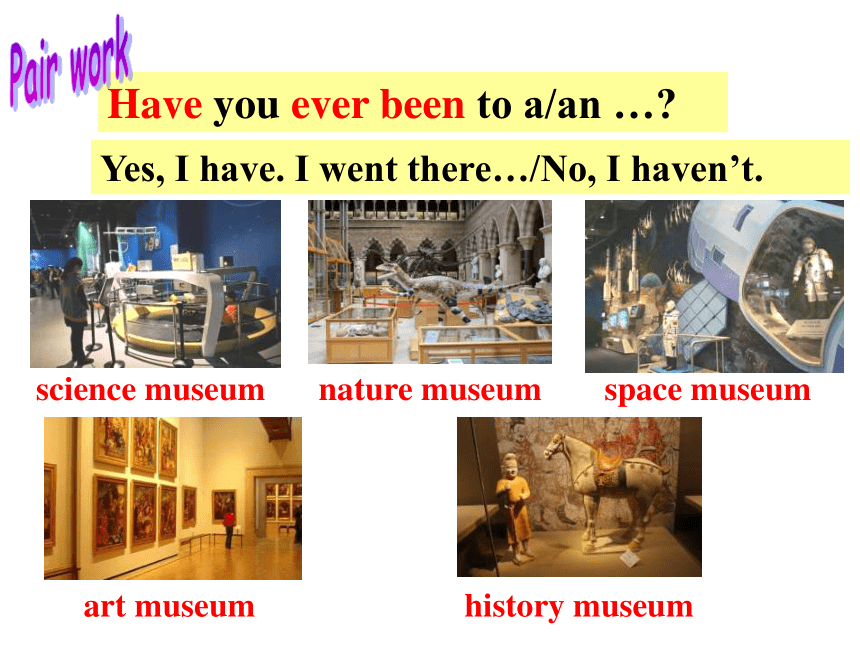
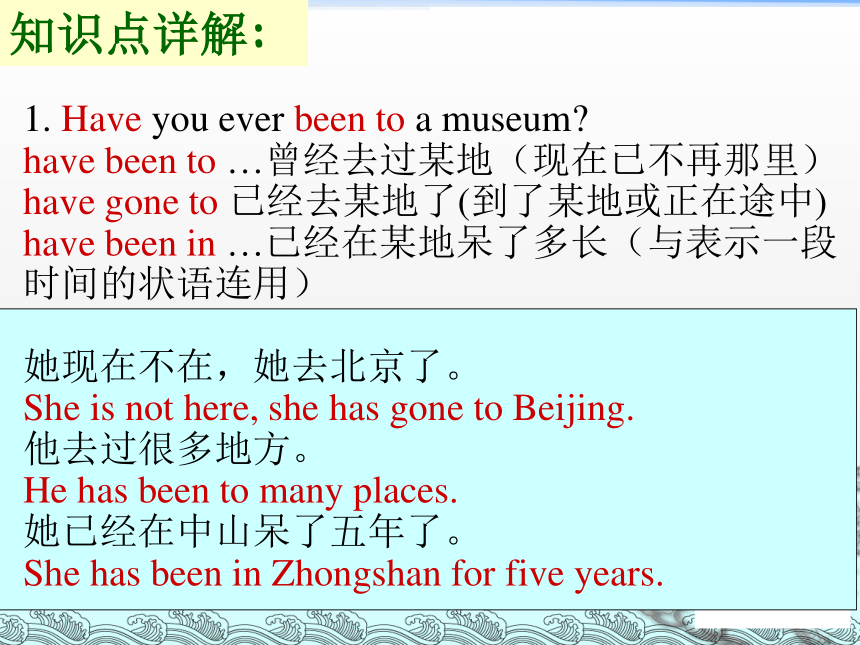
文档简介
(共56张PPT)
Unit 9
Have you ever been to a museum?
museum
What kinds of museums do you know?
space museum
history museum
science museum
art museum
nature museum
water park
zoo
amusement park
other places
Game: Tell the names of the places quickly.
an art museum
a space museum
an amusement park
a water park
a history museum
I went to this place before, so I can say:
I have been to an amusement park.
"曾经到过某地"
A :Have you ever been to …?
history museum
副词,"曾经"
副词,"从未;从不"
×
A: Have you ever been to …?
B: Yes, I have.
I have ever been to…
C:Me, too.
√
"我也去过"
A: Have you ever been to …?
B: No, I haven’t.
I have never been to…
C:Me, neither.
×
"我也没去过"
A: Have you ever been to …?
B: Yes, I have.
I have ever been to…
C: Me, too.
√
space museum
history museum
science museum
art museum
nature museum
Have you ever been to a/an …?
Yes, I have. I went there…/No, I haven’t.
知识点详解:
1. Have you ever been to a museum?
have been to …曾经去过某地(现在已不再那里)
have gone to 已经去某地了(到了某地或正在途中)
have been in …已经在某地呆了多长(与表示一段时间的状语连用)
她现在不在,她去北京了。
She is not here, she has gone to Beijing.
他去过很多地方。
He has been to many places.
她已经在中山呆了五年了。
She has been in Zhongshan for five years.
ever 常用于现在完成时的一般疑问句,放在主语的后面,过去分词的前面。
never 表示否定,在助动词have / has 之后,过去分词之前。
ever, never 是现在完成时的两个标志词。
下面我们一起看看这两个词的用法:
2. --I haven't been to the Great Wall.
--Me neither. 我也不。
Me neither = Neither have I.
A. 否定句中的“也”
①主语 + neither
②Neither+助动词/情态动词/be+主语(..也不)
③的否定句后加either,但要加逗号隔开
-He didn’t go to school.
-Me neither.
-Neither did I.
-I didn’t go to school, either.
她是个好学生。
She is a good student.
我也是。
Me too.
So am I.
I am a good student, too.
B.肯定句中的“也”
主语 + too
?So+助动词/情态动词/be+主语(..也是)
完整的肯定句后加too,且要用逗号隔开。
1. He ____ ______ (be) to the History
Museum several times.
2. A: _____ you ever _____ (be) to the zoo?
B: Yes. I _____(go) there last summer. I
____ (see) many kinds of animals
there.
3. A: Where is Mr. Wang?
B: He ________ (go) to the library. He
wants to borrow some library books.
has
been
Have
been
went
saw
has gone
用所给的正确形式填空。
1. — Have you _____read the poem If ?
— Yes. I really enjoy it.
A. still B. never C. yet D. ever
2. — ____you ever ____West Lake before?
— Yes. I went there last summer.
A. Have; been in B. Have; gone to
C. Have; been to
4. Rodgers _______ (plant) those trees. He ____ (do) it the day before yesterday.
5. We ____ _______ (learn) English for more than two years.
planted
did
have learned
— Peter has never been to a water park.
— _____.
A. I haven’t neither B. I haven’t too C. Me too D. Me neither
3. — Have you ever been to Hangzhou,
Lucy?
— No, I haven’t. What about you?
— ______.
A. So do I B. Me neither
C. Me, too D. So have I
4. — I prefer to eat cakes that have cream
on top.
— ____! They are delicious.
A. Good luck B. Me, too
C. I hope so D. You’re kidding
3.【反意疑问句】
一、定义:即附加疑问句。表示提问人的看法,没有把握,需要对方证实。
二、结构: 陈述句 + 附加疑问句?
It’s hot today ,isn’t it ?
三、原则:
1.前肯后否,前否后肯
2.前名后代
3.时态一致
They work hard, don’t they?
四、做题方法
(一)找动词
(1)如果句中有助动词、情态动词、be动词,反意疑问句中也相应的用助动词、情态动词、be动词。 He is a student ,_____________?
(2) 如果句中没有助动词、情态动词、be动词,只有实义动词时,就要借助助动词。
She often get up at 6:30 every morning,_____?
(二) 判断句子是肯还是否,“前肯后否,前否后肯”
The students have planted many trees, ____?
(三) 反意疑问句的主语必须转换成人称代词主格。 The boy can’t swim,___________?
五. Let’s go to Beijing tomorrow.
⑴ Let’s 中us 包括对方,反意疑问句用 shall we
Let’s go and listen to the music, ____________?
⑵ Let us 不包括对方, 反意疑问句用will you
Let us wait for you in the reading room, ___________?
⑶ Let sb. do sth 让某人做某事 (sb.应用人称代词的宾格形式)
注意:陈述句中有not, no ,hardly, neither, never, few, little等否定词或具有否定意义的词时,疑问部分用肯定
Eg. Few people knew the news, did they?
There be 句型反义疑问句:be there
?
4. Let’s go somewhere different today.
形容词修饰不定代词/副词,放在不定代词之后。
【注】somewhere 表达地点时, 前面不用介词。
Go and paly somewhere else.
【拓展】不定副词:somewhere , anywhere, nowhere
Somewhere 在某处 用在肯定句中
Anywhere 无论何处 用在否定句或疑问句中
nowhere 在什么地方都不 否定词,=not…anywhere
everywhere 各处,到处 =here and there
【用法】不定副词被定语修饰时,定语必须放在其后
somewhere warm 暖和的地方
( ) ①I don’t want to go ______.
A. somewhere cold B. cold somewhere
C. anywhere cold D. cold anywhere
( )② — Do you have your summer plan, Bill?
— Well, I want to go ______ to relax with my family.
A. interesting somewhere B. nowhere interesting C. somewhere interesting
-Where would you like to go on vacation, Lily?
- It’s hot here. I’d like to go ____.
A. Anywhere cool B.cool somewhere C.somewhere cool
SectionA
1. I learned about the inventions that led to color movies, too.
我还了解了一些发明,它们成就了彩色电影。
【解析】invent v 发明→inventor n 发明家→ invention n 发明
【记】Edison , a great _________, __________over 1’000__________ all his life.(invent)
①. I think the light is one of the most important__________(invent)
②.The car ___________(invent) in 1885.
2. lead →led→ led v引导,引诱
→ leader n 领导人
【谚语】All roads lead to Rome. 条条大路通罗马
【拓展】 lead to sth 导致/通向/成就……
lead sb. to sp 引导某人去某地
lead sb. to do sth 引导某人做某事
Eg. Hard work leads to success. Laziness leads to failing the exam.
Eg.Excuse?me,?does?this?road?lead?to?the?railway?
station??
Eg. This leads him to make a mistake.
3. We put up a tent and cooked outside.
我们搭起帐篷,在户外做饭。
【解析】put up 搭起;举起;张贴
【短语】put away 把…收起来 put on 穿上 put up 张贴 ;举起;搭建 put out 熄灭 put down 放下 put…into… 把……放进
例_______ your sunglasses, Sally. The sun is so bright.
A. Put down B. Put up
C. Put away D. Put on
4. Let’s go to one tomorrow
One 代可n.单数,同类异物
It 代可n.单数或不可数n, 同类同物
that 代可n.单数或不可数n. 某一事物/某句话, that可以和do 连用来代替上文提到的动作
Eg.
I don’t like this pen, please show me another one.
I have an interesting book. would you like to read it?
The weather in Beijing is colder than that in Wuhan
5. They have information about different computers and who invented them.
【辨析】information/message/ news
⑴information指电视、电脑或其它杂志等获得的信息,为不可n. a piece of information 一条信息
Eg. You can get much information on the Internet
⑵message“消息、口信” 指书面、口头、无线电信息,为可数n.
Eg. I’ll leave a message for her. 我将为她留个口信。
⑶news“新闻,消息”,新闻媒介报道的最新消息,为不可n. a piece of news 一则新闻
【谚语】No news is good news 没有消息就是好消息 ?
1.—What ______ can you give me on learning English? —I think you could join an English club
A advice B news C messages D information
2.Just search the internet, you can get almost all the _____ you need.
A. informations B. information
C. picture D. story
3.—Where is Thomas? —He left a ______ .
A. information B. message C. news
4.The students didn’t find much ___ about the topic on that website.
A. report B. article C. information D. story
6. It’s unbelievable that technology has progressed in such a rapid way! 真是难以置信,科技发展的竟然如此迅速。
(1)unbelievable 难以置信的;
believe v.相信 believe sb 相信某人
believe in sb 信任某人=trust sb
【记】believe +able = believable 可信的
un + believable =unbelievable 难以置信的
Eg. That story is unbelievable.
(2)progress v进步;进展 n(不可数n)
make much/great/rapid progress 取得进步
make progress in 在......方面 取得进步
Eg. I have made much progress in English.
— Why is Harvey’s mother so happy?
— Because only three students _____, ____ his son Harvey.
A. failed the exam ;besides
B. made progress; except
C. made progress; including
D. passed the exam; without
(3)rapid adj.迅速的;快速的= quick /fast
rapid development 迅速发展
rapidly adv. 迅速地,快速地
eg. He has made rapid progress in his studies.
rapid 强调反应“敏捷”等 She made a rapid decision.
quick 强调时间 “短“ There will be a quick visit.
Fast 强调速度 “ 快” I can run fast .
7. I wonder how much more computers will be able to do in the future. 我想知道未来的电脑还能做多少事情。
wonder ⑴ v想要知道= want to know
后接who/what /how/if /weather宾语从句
Eg. I wonder who she is
也可接“疑问词+不定式”
Eg. I wonder what to do next.
⑵ n. 惊奇;奇观
Eg. The seven wonders of the world
—I wonder when you _______in New York
—I will send an e-mail to you as soon as I _______there.
arrive; will get B. will arrive; get
C. will arrive; will get
8. I’ve really been to a very unusual museum in India , the International Museum of Toilets. 我最近去了印度的一个不同寻常的博物馆—— 国际厕所博物馆。
unusual adj.特别的;不同寻常的(反)
usual adj.通常的 as usual 像往常一样
usually adv.通常 He usually gets up at 5:00
an unusual experience 不同寻常的经历
例:-This is a useful dictionary, I think.
-So it is, and it’s ____________unusual one.
A . the B. an C. a D. 不填
【拓展】 un + adj.
unhappy unfortunate uneasy(不舒服的;不安的) unlucky unable unfriendly unknown unimportant unfair unbelievable 难以置信的
9. It also encourage governments and social groups to think about ways to improve toilets in the future.
(博物馆) 并且鼓励政府和社会团体来考虑一下未来改进厕所的方法。
(1)encourage sb. to do sth 鼓励某人做某事
encourage sb. in sth 在某方面鼓励某人
Eg. Our teacher often encourages us to study hard
encouragement n. 鼓励,其激励作用的事物
Eg. With encouragement ,he is starting to play with the other children.
例:Jessica’s parents always encourage her ___ out her opinions.
A. speak B. speaking C. to speak D. will speak
(2)social 社会的→ society n 社会
→socialist 社会主意者→socialize v. 交际,交往→socialism n.社会主义
social problem 社会问题
Eg. We should study hard to get into good university in today’s society.
Eg. There are few social problems, such as population, pollution in today’s society
Eg. Maybe you should socialize more
10. a relaxing and peaceful place near a lake.
它靠近湖,是一个令人放松和安静的地方。
peaceful adj. 和平的,安宁的
peace n 和平→ peaceful adj. 和平的
→ peacefully adv 和平地
* beauty n 美丽 →beautiful adj. 美丽的
help n 帮助 →helpful adj. 有帮助的
use n 用途 →useful adj. 有用的
thank n感谢 →thankful adj. 感激的
That night was so ____________(peace)
All the people who love ________hope that the world is _________forever, without wars.(peace)
11. The tea art performances show how to make a perfect cup of tea with beautiful tea sets. 茶艺表演展示了如何用精美的茶具冲一杯完美的茶。
(1)perform v 表演;演出
performance n 演出;表演
musical performance 音乐演奏
(2)perfect adj. 完美的 (无比较级)
perfectly adv. 完美的,完全的
Practice makes perfect. 熟能生巧
( ) She speaks English ____ than I .
A. Perfect B. Perfectly
C.more perfect D.more perfectly.
12. Watching them prepare the tea with the beautiful tea sets is just as enjoyable as drinking the tea itself. 看他们用漂亮的茶具来准备茶就像喝茶本身一样让人享受。
(1)tea sets 茶具
the tea art 茶艺
the tea art performance 茶艺表演
green tea 绿茶 black tea 红茶 milk tea 奶茶 Oolong tea 乌龙茶
make tea 泡茶 serve tea to ... 给.......敬茶
enjoy oneself=have fun
=have a good time 玩得高兴
by oneself =alone 独自
teach oneself=learn …by oneself 自学
help oneself to 随便吃
introduce oneself to 自我介绍
hurt oneself 伤到自己
improve oneself 提高自己
look after oneself 照顾自己
leave sb by oneself 把某人单独留下
lose oneself in 沉迷于
say to oneself 自言自语
dress oneself 给某人自己穿衣服
13. collect v 收集→ collection n收藏
→collector收藏家
collect stamps /coins 收集邮票/硬币
have a collection of books 收藏书
【记】He is a famous ____________ and he has _________ a lot of _________(collect).
1. He is a great __________. Now he has a great ________of stamps.(collect).
2.____ you ____ stamps since you were six?
Did; collect B. Do; collect
C. Have; collect D. Have ; been collecting
14. You can also see (see) the Disney characters walking around the park.
walk around 四处走动
go around 四处走动; look around 环顾;参观
travel around 到处旅游 show sb around sp. 带领某人参观某地
15. hear sb. do sth 听见某人做某事
Eg. I often hear him sing in the room.
hear sb. doing sth 听见某人正在做某事
Eg. I hear him singing in the room
hear of/about 听说
hear from =receive a letter from sb. 收到某人来信
I’m sorry to hear that.听到这件事我很难过(指听到别人不幸的消息时的用语)
( ) When the little boy _____ someone coming upstairs, he stopped _____.
A. heard; to cry B .listened; crying
C. heard; crying D .listened; to cry
( ) ① How often do you_____ your sister?
A.hear B. hear of
C. hear from D .hear about
( ) ②— Mike hurt his arm the day before yesterday. Now he’s in hospital. —_____.
A. I’m sorry to hear that B. That’s all right.
C.I hope you’ll feel better soon.
16. a couple of 两个;几个
a couple of +可数n. 复数 +v复数
Eg. There are a couple of beds in the room.
Eg. I’ve already been there a couple of times, but I’m happy to go again.
Eg. This pair of shoes is a bit small for me.
a couple of 通常指同类事物中的任意两个或几个,不一定是成对的使用
a pair of “一双(对、副......) ,通常指成对使用的的东西。 如一双鞋等
17.There are some special German paintings there right now
那里现在有一些特别的德国油画
German adj.德国的,德语的,德国人的
n. 德语(不可数),德国人(可数)
Eg. German cars are different from ours
I know a little German
There are a few Germans in our school
Germany n. 德国
Eg. My best friend comes from Germany
18. take a ride 兜风 take ( took , taken ) v (vt)
take away
take care (=be careful=look out)
take (good) care of
take down
take out
take off
take one's time
take one's temperature
take a walk
take a rest
1. safe adj.安全的 → dangerous adj 危险的
safety n. 安全 → danger n. 危险
safely adv安全地→dangerously adv. 危险地
safety belt 安全带 safety first 安全第一
【2013山东莱芜】The plane landed ____________ (safe) yesterday.
【2011浙江丽水】Everybody should remember it is not _____ to swim in the river alone.
A.healthy B. safe C.possible D.comfortable
Section B
2. On the one hand, more than three quarters of the population are Chinese, so you can simply speak Putonghua a lot of the time.
three quarters 四分之三(分数表达法)
【分数词的表达法】:
1).结构: a).分子用基数词,分母用序数词.
分子(基数词) 1
分母(序数词) 4 = one fourth = one quarter
b).当分子大于1时,分母加s.
? = three fourths = three quarters
2).注意: 分数词的几种特殊形式.
1/3—one third = a third
1/4—one fourth = a quarter
1/2—one second = a half
3/4—three fourths = three quarters
不可数名词 +动词单三形式
分数 + of +
可数名词复数 + 动词变复数形式
Eg. Two fifths of the milk ___(be ) drunk by Tom .
Eg. One third of the students _______(be )girls .
( ) The number of the students in our grade ___ about ___ of them are girls.
A. are, six hundreds ; two thirds
B. is ; six hundred; two third
C. is ; six hundred; two thirds
D. are; six hundred; two third
3.simply adv. 仅仅,只=just/only
adv. 简单的, 简朴的
simple adj. 简单的, 容易的
Eg. The book explains grammar simply and early
Eg. The machine is very simple to use
4. On the one hand…on the other hand
一方面…另一方面…
Eg. On the one hand, teachers should take good care of the students; on the other hand, students should respect their teachers
practice doing sth 练习做某事
5. fear v. 害怕,惧怕= be afraid of
fear to do sth 害怕做某事=Be afraid to do sth =
be afraid of doing sth
fear that宾从
Eg. She usually fears to go out at night alone
Eg. Maybe you fear that you won’t be able to find anything good to eat when you travel
n. 害怕惧怕 be in fear of 为….提心吊胆
Eg. We are in fear of tiger. 我们害怕老虎
6. Whether you like India food, Western food or Japanese food, you’ll find it all in Singapore.
(1 )whether 是否;
不管……(还是)或者……(或者),常与or连用。
引导让步状语从句,从句用一般现在时。
Eg. Whether you like it or not, you’ll have to do it.
不管这个消息是真是假,你都应该做好准备
Eg. He asked me weather I needed any help
(2)
during the daytime = in the daytime/day 在白天
Indian adj.印度的 n.印度人
India n. 印度
Japanese adj 日本的,日本人的
n. 日本人(可数,单复同形),日语(不可数)
Japan n. 日本
7. all year round =all the year round 全年
Eg. My parents are very busy all year round
8. whenever =no matter when 在任何…的时候;无论何时
Eg. You can choose to go whenever you like
Eg. Whenever/no matter when it happened , it was certainly not last Friday.
whatever=no matter what 无论什么
whichever=no matter witch 无论哪个
wherever=no matter where 无论哪里
whoever=no mater who 无论谁
however=no matter how 无论怎样
9. close adj. 离......近,与.......亲近的
(1) v 关(反) open →closed? adj. 关的
adj.密切的 be close to …离…近
a close friend 一个亲密的朋友
Eg. My home is close to the school.
adv. 接近地 靠近地
Eg. Today I come close to be late.
open v 开→ open adj. 开着的
close v 关 →closed 关闭的
旅行开阔眼界。
Unit 9
Have you ever been to a museum?
museum
What kinds of museums do you know?
space museum
history museum
science museum
art museum
nature museum
water park
zoo
amusement park
other places
Game: Tell the names of the places quickly.
an art museum
a space museum
an amusement park
a water park
a history museum
I went to this place before, so I can say:
I have been to an amusement park.
"曾经到过某地"
A :Have you ever been to …?
history museum
副词,"曾经"
副词,"从未;从不"
×
A: Have you ever been to …?
B: Yes, I have.
I have ever been to…
C:Me, too.
√
"我也去过"
A: Have you ever been to …?
B: No, I haven’t.
I have never been to…
C:Me, neither.
×
"我也没去过"
A: Have you ever been to …?
B: Yes, I have.
I have ever been to…
C: Me, too.
√
space museum
history museum
science museum
art museum
nature museum
Have you ever been to a/an …?
Yes, I have. I went there…/No, I haven’t.
知识点详解:
1. Have you ever been to a museum?
have been to …曾经去过某地(现在已不再那里)
have gone to 已经去某地了(到了某地或正在途中)
have been in …已经在某地呆了多长(与表示一段时间的状语连用)
她现在不在,她去北京了。
She is not here, she has gone to Beijing.
他去过很多地方。
He has been to many places.
她已经在中山呆了五年了。
She has been in Zhongshan for five years.
ever 常用于现在完成时的一般疑问句,放在主语的后面,过去分词的前面。
never 表示否定,在助动词have / has 之后,过去分词之前。
ever, never 是现在完成时的两个标志词。
下面我们一起看看这两个词的用法:
2. --I haven't been to the Great Wall.
--Me neither. 我也不。
Me neither = Neither have I.
A. 否定句中的“也”
①主语 + neither
②Neither+助动词/情态动词/be+主语(..也不)
③的否定句后加either,但要加逗号隔开
-He didn’t go to school.
-Me neither.
-Neither did I.
-I didn’t go to school, either.
她是个好学生。
She is a good student.
我也是。
Me too.
So am I.
I am a good student, too.
B.肯定句中的“也”
主语 + too
?So+助动词/情态动词/be+主语(..也是)
完整的肯定句后加too,且要用逗号隔开。
1. He ____ ______ (be) to the History
Museum several times.
2. A: _____ you ever _____ (be) to the zoo?
B: Yes. I _____(go) there last summer. I
____ (see) many kinds of animals
there.
3. A: Where is Mr. Wang?
B: He ________ (go) to the library. He
wants to borrow some library books.
has
been
Have
been
went
saw
has gone
用所给的正确形式填空。
1. — Have you _____read the poem If ?
— Yes. I really enjoy it.
A. still B. never C. yet D. ever
2. — ____you ever ____West Lake before?
— Yes. I went there last summer.
A. Have; been in B. Have; gone to
C. Have; been to
4. Rodgers _______ (plant) those trees. He ____ (do) it the day before yesterday.
5. We ____ _______ (learn) English for more than two years.
planted
did
have learned
— Peter has never been to a water park.
— _____.
A. I haven’t neither B. I haven’t too C. Me too D. Me neither
3. — Have you ever been to Hangzhou,
Lucy?
— No, I haven’t. What about you?
— ______.
A. So do I B. Me neither
C. Me, too D. So have I
4. — I prefer to eat cakes that have cream
on top.
— ____! They are delicious.
A. Good luck B. Me, too
C. I hope so D. You’re kidding
3.【反意疑问句】
一、定义:即附加疑问句。表示提问人的看法,没有把握,需要对方证实。
二、结构: 陈述句 + 附加疑问句?
It’s hot today ,isn’t it ?
三、原则:
1.前肯后否,前否后肯
2.前名后代
3.时态一致
They work hard, don’t they?
四、做题方法
(一)找动词
(1)如果句中有助动词、情态动词、be动词,反意疑问句中也相应的用助动词、情态动词、be动词。 He is a student ,_____________?
(2) 如果句中没有助动词、情态动词、be动词,只有实义动词时,就要借助助动词。
She often get up at 6:30 every morning,_____?
(二) 判断句子是肯还是否,“前肯后否,前否后肯”
The students have planted many trees, ____?
(三) 反意疑问句的主语必须转换成人称代词主格。 The boy can’t swim,___________?
五. Let’s go to Beijing tomorrow.
⑴ Let’s 中us 包括对方,反意疑问句用 shall we
Let’s go and listen to the music, ____________?
⑵ Let us 不包括对方, 反意疑问句用will you
Let us wait for you in the reading room, ___________?
⑶ Let sb. do sth 让某人做某事 (sb.应用人称代词的宾格形式)
注意:陈述句中有not, no ,hardly, neither, never, few, little等否定词或具有否定意义的词时,疑问部分用肯定
Eg. Few people knew the news, did they?
There be 句型反义疑问句:be there
?
4. Let’s go somewhere different today.
形容词修饰不定代词/副词,放在不定代词之后。
【注】somewhere 表达地点时, 前面不用介词。
Go and paly somewhere else.
【拓展】不定副词:somewhere , anywhere, nowhere
Somewhere 在某处 用在肯定句中
Anywhere 无论何处 用在否定句或疑问句中
nowhere 在什么地方都不 否定词,=not…anywhere
everywhere 各处,到处 =here and there
【用法】不定副词被定语修饰时,定语必须放在其后
somewhere warm 暖和的地方
( ) ①I don’t want to go ______.
A. somewhere cold B. cold somewhere
C. anywhere cold D. cold anywhere
( )② — Do you have your summer plan, Bill?
— Well, I want to go ______ to relax with my family.
A. interesting somewhere B. nowhere interesting C. somewhere interesting
-Where would you like to go on vacation, Lily?
- It’s hot here. I’d like to go ____.
A. Anywhere cool B.cool somewhere C.somewhere cool
SectionA
1. I learned about the inventions that led to color movies, too.
我还了解了一些发明,它们成就了彩色电影。
【解析】invent v 发明→inventor n 发明家→ invention n 发明
【记】Edison , a great _________, __________over 1’000__________ all his life.(invent)
①. I think the light is one of the most important__________(invent)
②.The car ___________(invent) in 1885.
2. lead →led→ led v引导,引诱
→ leader n 领导人
【谚语】All roads lead to Rome. 条条大路通罗马
【拓展】 lead to sth 导致/通向/成就……
lead sb. to sp 引导某人去某地
lead sb. to do sth 引导某人做某事
Eg. Hard work leads to success. Laziness leads to failing the exam.
Eg.Excuse?me,?does?this?road?lead?to?the?railway?
station??
Eg. This leads him to make a mistake.
3. We put up a tent and cooked outside.
我们搭起帐篷,在户外做饭。
【解析】put up 搭起;举起;张贴
【短语】put away 把…收起来 put on 穿上 put up 张贴 ;举起;搭建 put out 熄灭 put down 放下 put…into… 把……放进
例_______ your sunglasses, Sally. The sun is so bright.
A. Put down B. Put up
C. Put away D. Put on
4. Let’s go to one tomorrow
One 代可n.单数,同类异物
It 代可n.单数或不可数n, 同类同物
that 代可n.单数或不可数n. 某一事物/某句话, that可以和do 连用来代替上文提到的动作
Eg.
I don’t like this pen, please show me another one.
I have an interesting book. would you like to read it?
The weather in Beijing is colder than that in Wuhan
5. They have information about different computers and who invented them.
【辨析】information/message/ news
⑴information指电视、电脑或其它杂志等获得的信息,为不可n. a piece of information 一条信息
Eg. You can get much information on the Internet
⑵message“消息、口信” 指书面、口头、无线电信息,为可数n.
Eg. I’ll leave a message for her. 我将为她留个口信。
⑶news“新闻,消息”,新闻媒介报道的最新消息,为不可n. a piece of news 一则新闻
【谚语】No news is good news 没有消息就是好消息 ?
1.—What ______ can you give me on learning English? —I think you could join an English club
A advice B news C messages D information
2.Just search the internet, you can get almost all the _____ you need.
A. informations B. information
C. picture D. story
3.—Where is Thomas? —He left a ______ .
A. information B. message C. news
4.The students didn’t find much ___ about the topic on that website.
A. report B. article C. information D. story
6. It’s unbelievable that technology has progressed in such a rapid way! 真是难以置信,科技发展的竟然如此迅速。
(1)unbelievable 难以置信的;
believe v.相信 believe sb 相信某人
believe in sb 信任某人=trust sb
【记】believe +able = believable 可信的
un + believable =unbelievable 难以置信的
Eg. That story is unbelievable.
(2)progress v进步;进展 n(不可数n)
make much/great/rapid progress 取得进步
make progress in 在......方面 取得进步
Eg. I have made much progress in English.
— Why is Harvey’s mother so happy?
— Because only three students _____, ____ his son Harvey.
A. failed the exam ;besides
B. made progress; except
C. made progress; including
D. passed the exam; without
(3)rapid adj.迅速的;快速的= quick /fast
rapid development 迅速发展
rapidly adv. 迅速地,快速地
eg. He has made rapid progress in his studies.
rapid 强调反应“敏捷”等 She made a rapid decision.
quick 强调时间 “短“ There will be a quick visit.
Fast 强调速度 “ 快” I can run fast .
7. I wonder how much more computers will be able to do in the future. 我想知道未来的电脑还能做多少事情。
wonder ⑴ v想要知道= want to know
后接who/what /how/if /weather宾语从句
Eg. I wonder who she is
也可接“疑问词+不定式”
Eg. I wonder what to do next.
⑵ n. 惊奇;奇观
Eg. The seven wonders of the world
—I wonder when you _______in New York
—I will send an e-mail to you as soon as I _______there.
arrive; will get B. will arrive; get
C. will arrive; will get
8. I’ve really been to a very unusual museum in India , the International Museum of Toilets. 我最近去了印度的一个不同寻常的博物馆—— 国际厕所博物馆。
unusual adj.特别的;不同寻常的(反)
usual adj.通常的 as usual 像往常一样
usually adv.通常 He usually gets up at 5:00
an unusual experience 不同寻常的经历
例:-This is a useful dictionary, I think.
-So it is, and it’s ____________unusual one.
A . the B. an C. a D. 不填
【拓展】 un + adj.
unhappy unfortunate uneasy(不舒服的;不安的) unlucky unable unfriendly unknown unimportant unfair unbelievable 难以置信的
9. It also encourage governments and social groups to think about ways to improve toilets in the future.
(博物馆) 并且鼓励政府和社会团体来考虑一下未来改进厕所的方法。
(1)encourage sb. to do sth 鼓励某人做某事
encourage sb. in sth 在某方面鼓励某人
Eg. Our teacher often encourages us to study hard
encouragement n. 鼓励,其激励作用的事物
Eg. With encouragement ,he is starting to play with the other children.
例:Jessica’s parents always encourage her ___ out her opinions.
A. speak B. speaking C. to speak D. will speak
(2)social 社会的→ society n 社会
→socialist 社会主意者→socialize v. 交际,交往→socialism n.社会主义
social problem 社会问题
Eg. We should study hard to get into good university in today’s society.
Eg. There are few social problems, such as population, pollution in today’s society
Eg. Maybe you should socialize more
10. a relaxing and peaceful place near a lake.
它靠近湖,是一个令人放松和安静的地方。
peaceful adj. 和平的,安宁的
peace n 和平→ peaceful adj. 和平的
→ peacefully adv 和平地
* beauty n 美丽 →beautiful adj. 美丽的
help n 帮助 →helpful adj. 有帮助的
use n 用途 →useful adj. 有用的
thank n感谢 →thankful adj. 感激的
That night was so ____________(peace)
All the people who love ________hope that the world is _________forever, without wars.(peace)
11. The tea art performances show how to make a perfect cup of tea with beautiful tea sets. 茶艺表演展示了如何用精美的茶具冲一杯完美的茶。
(1)perform v 表演;演出
performance n 演出;表演
musical performance 音乐演奏
(2)perfect adj. 完美的 (无比较级)
perfectly adv. 完美的,完全的
Practice makes perfect. 熟能生巧
( ) She speaks English ____ than I .
A. Perfect B. Perfectly
C.more perfect D.more perfectly.
12. Watching them prepare the tea with the beautiful tea sets is just as enjoyable as drinking the tea itself. 看他们用漂亮的茶具来准备茶就像喝茶本身一样让人享受。
(1)tea sets 茶具
the tea art 茶艺
the tea art performance 茶艺表演
green tea 绿茶 black tea 红茶 milk tea 奶茶 Oolong tea 乌龙茶
make tea 泡茶 serve tea to ... 给.......敬茶
enjoy oneself=have fun
=have a good time 玩得高兴
by oneself =alone 独自
teach oneself=learn …by oneself 自学
help oneself to 随便吃
introduce oneself to 自我介绍
hurt oneself 伤到自己
improve oneself 提高自己
look after oneself 照顾自己
leave sb by oneself 把某人单独留下
lose oneself in 沉迷于
say to oneself 自言自语
dress oneself 给某人自己穿衣服
13. collect v 收集→ collection n收藏
→collector收藏家
collect stamps /coins 收集邮票/硬币
have a collection of books 收藏书
【记】He is a famous ____________ and he has _________ a lot of _________(collect).
1. He is a great __________. Now he has a great ________of stamps.(collect).
2.____ you ____ stamps since you were six?
Did; collect B. Do; collect
C. Have; collect D. Have ; been collecting
14. You can also see (see) the Disney characters walking around the park.
walk around 四处走动
go around 四处走动; look around 环顾;参观
travel around 到处旅游 show sb around sp. 带领某人参观某地
15. hear sb. do sth 听见某人做某事
Eg. I often hear him sing in the room.
hear sb. doing sth 听见某人正在做某事
Eg. I hear him singing in the room
hear of/about 听说
hear from =receive a letter from sb. 收到某人来信
I’m sorry to hear that.听到这件事我很难过(指听到别人不幸的消息时的用语)
( ) When the little boy _____ someone coming upstairs, he stopped _____.
A. heard; to cry B .listened; crying
C. heard; crying D .listened; to cry
( ) ① How often do you_____ your sister?
A.hear B. hear of
C. hear from D .hear about
( ) ②— Mike hurt his arm the day before yesterday. Now he’s in hospital. —_____.
A. I’m sorry to hear that B. That’s all right.
C.I hope you’ll feel better soon.
16. a couple of 两个;几个
a couple of +可数n. 复数 +v复数
Eg. There are a couple of beds in the room.
Eg. I’ve already been there a couple of times, but I’m happy to go again.
Eg. This pair of shoes is a bit small for me.
a couple of 通常指同类事物中的任意两个或几个,不一定是成对的使用
a pair of “一双(对、副......) ,通常指成对使用的的东西。 如一双鞋等
17.There are some special German paintings there right now
那里现在有一些特别的德国油画
German adj.德国的,德语的,德国人的
n. 德语(不可数),德国人(可数)
Eg. German cars are different from ours
I know a little German
There are a few Germans in our school
Germany n. 德国
Eg. My best friend comes from Germany
18. take a ride 兜风 take ( took , taken ) v (vt)
take away
take care (=be careful=look out)
take (good) care of
take down
take out
take off
take one's time
take one's temperature
take a walk
take a rest
1. safe adj.安全的 → dangerous adj 危险的
safety n. 安全 → danger n. 危险
safely adv安全地→dangerously adv. 危险地
safety belt 安全带 safety first 安全第一
【2013山东莱芜】The plane landed ____________ (safe) yesterday.
【2011浙江丽水】Everybody should remember it is not _____ to swim in the river alone.
A.healthy B. safe C.possible D.comfortable
Section B
2. On the one hand, more than three quarters of the population are Chinese, so you can simply speak Putonghua a lot of the time.
three quarters 四分之三(分数表达法)
【分数词的表达法】:
1).结构: a).分子用基数词,分母用序数词.
分子(基数词) 1
分母(序数词) 4 = one fourth = one quarter
b).当分子大于1时,分母加s.
? = three fourths = three quarters
2).注意: 分数词的几种特殊形式.
1/3—one third = a third
1/4—one fourth = a quarter
1/2—one second = a half
3/4—three fourths = three quarters
不可数名词 +动词单三形式
分数 + of +
可数名词复数 + 动词变复数形式
Eg. Two fifths of the milk ___(be ) drunk by Tom .
Eg. One third of the students _______(be )girls .
( ) The number of the students in our grade ___ about ___ of them are girls.
A. are, six hundreds ; two thirds
B. is ; six hundred; two third
C. is ; six hundred; two thirds
D. are; six hundred; two third
3.simply adv. 仅仅,只=just/only
adv. 简单的, 简朴的
simple adj. 简单的, 容易的
Eg. The book explains grammar simply and early
Eg. The machine is very simple to use
4. On the one hand…on the other hand
一方面…另一方面…
Eg. On the one hand, teachers should take good care of the students; on the other hand, students should respect their teachers
practice doing sth 练习做某事
5. fear v. 害怕,惧怕= be afraid of
fear to do sth 害怕做某事=Be afraid to do sth =
be afraid of doing sth
fear that宾从
Eg. She usually fears to go out at night alone
Eg. Maybe you fear that you won’t be able to find anything good to eat when you travel
n. 害怕惧怕 be in fear of 为….提心吊胆
Eg. We are in fear of tiger. 我们害怕老虎
6. Whether you like India food, Western food or Japanese food, you’ll find it all in Singapore.
(1 )whether 是否;
不管……(还是)或者……(或者),常与or连用。
引导让步状语从句,从句用一般现在时。
Eg. Whether you like it or not, you’ll have to do it.
不管这个消息是真是假,你都应该做好准备
Eg. He asked me weather I needed any help
(2)
during the daytime = in the daytime/day 在白天
Indian adj.印度的 n.印度人
India n. 印度
Japanese adj 日本的,日本人的
n. 日本人(可数,单复同形),日语(不可数)
Japan n. 日本
7. all year round =all the year round 全年
Eg. My parents are very busy all year round
8. whenever =no matter when 在任何…的时候;无论何时
Eg. You can choose to go whenever you like
Eg. Whenever/no matter when it happened , it was certainly not last Friday.
whatever=no matter what 无论什么
whichever=no matter witch 无论哪个
wherever=no matter where 无论哪里
whoever=no mater who 无论谁
however=no matter how 无论怎样
9. close adj. 离......近,与.......亲近的
(1) v 关(反) open →closed? adj. 关的
adj.密切的 be close to …离…近
a close friend 一个亲密的朋友
Eg. My home is close to the school.
adv. 接近地 靠近地
Eg. Today I come close to be late.
open v 开→ open adj. 开着的
close v 关 →closed 关闭的
旅行开阔眼界。
同课章节目录
- Unit 1 What's the matter?
- Section A
- Section B
- Unit 2 I'll help to clean up the city parks.
- Section A
- Section B
- Unit 3 Could you please clean your room?
- Section A
- Section B
- Unit 4 Why don't you talk to your parents?
- Section A
- Section B
- Unit 5 What were you doing when the rainstorm came
- Section A
- Section B
- Review of Units 1-5
- Unit 6 An old man tried to move the mountains.
- Section A
- Section B
- Unit 7 What's the highest mountain in the world?
- Section A
- Section B
- Unit 8 Have you read Treasure Island yet?
- Section A
- Section B
- Unit 9 Have you ever been to a museum?
- Section A
- Section B
- Unit 10 I've had this bike for three years.
- Section A
- Section B
